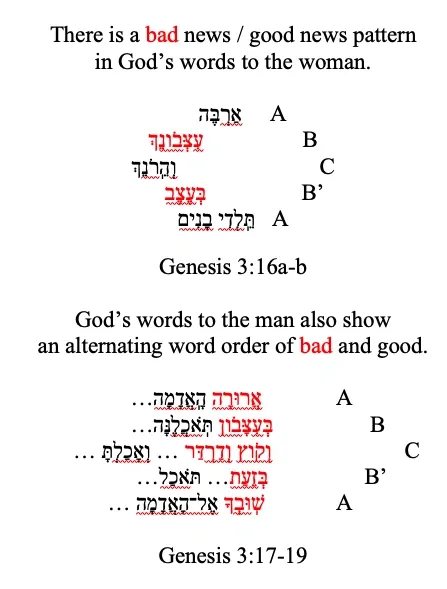
How the Hebrew Text of Genesis 3:16b Can Be Translated.
by Joy Fleming, PhD, PsyD
Genesis 3:16 can be translated as follows (with line b in bold):
I will greatly multiply your sorrowful toil and your conception.
With sorrow you will bring forth children.
Your desire is for your husband,
But he will rule over you.
Rationale: עֶ֖צֶב (‘etseb) in 3:16b may be more about sorrow or grief than physical pain. עֶ֖צֶב seems to be a general term, as per other occurrences in the OT, and is not elsewhere used regarding having children (or childbirth). By choosing to focus on “pain,” translators are eliminating the larger meaning that is present explicitly or implicitly in most if not all of the other occurrences of ‘etseb in the OT–that of “sorrow.”
In Gn 3:16a God was a direct agent bringing about change (I will greatly multiply …). However in Gn 3:16b (as well as in lines c and d) God is not a direct agent. He is simply describing what it will be like for the woman to live in a world that now is marred by good and evil. The good news is she will have multiple children but the sad news is that her heart will be broken by having sinful children. Line b of 3:16 may not be about painful labor in childbirth; God is not changing her body. God appears to be alerting her that her experience of bringing children into the world will not be “very good” as it would have been. It will be a mixture of “good and evil,” which will bring her sorrow. Her life will be one with fulfilled blessing and hope on the one hand (still having children in fulfillment of the creation blessing in Gn 1:28 and hope of the coming Deliverer promised in 3:15) and with heartfelt sorrow on the other hand. Sorrow is experienced all too soon in regard to her children (in Gn 4) when her first child Cain utters rebellious and defiant words to God and murders her second child Abel.
“Bring forth” seems preferable to “give birth to” because of its more general connotation; it could also be worded as “be the mother of” (cf. יָלַד in Gn 4:18 NIV “was the father of”). The concept seems to be that she will beget or produce children.
—There is a “bad news / good news” pattern in the Hebrew text of Gn 3:16a-b and in 3:17-19 (see diagrams above).[1] The two who ate of the tree of the knowledge of good and evil now, in the new fallen world, will experience a mix of both good and evil in their lives. הַרְבָּה אַרְבֶּה (harbah ‘arbeh “Multiplying, I will multiply …”) is good. (In the two other occurrences of harbah ‘arbeh in the OT, Gn 16:10 and Gn 22:16-18, this expression is clearly positive, is completed by the word זֶרַע zera’ (seed or offspring) and to Abraham is associated with blessing.) עִצָּבוֹן (‘itsabon, sorrowful toil from working the ground which the Lord God curses) is bad. הֵרוֹן (heron, pregnancy or conception) is good. עֵצֶב (‘etseb sorrow) is bad. בָנִים תֵּלְדִי (teldi banim bring forth children) is good.
A harbah ‘arbeh multiplying, I-will-multiply
B ‘istəbonek your-sorrowful-toil
C wəheronek and-your-conception
B’ bə‘etseb with-sorrow
A’ teldi banim you-will-bring-forth children
—Why did the author use the word עֶ֖צֶב in Gn 3:16b? Among other reasons is the following. There are a number of rhetorical literary devices employed by the author in this passage. The linchpin construction (see article on Gn 3:16a) is one of them. Another device is the use of puns. In this case, the author makes a pun on the word עֵץ ‘ets (tree; in 3:1-3). Eating of ‘ets (the tree) results in עִצְּבֹונֵ ‘itsebon and עֶ֖צֶב ‘etseb.
—3:16b is not a reiteration of 3:16a. The author uses different Hebrew words הֵֽרֹן and עִצָּבוֹן and עֶ֖צֶב, expressing different concepts. In line b, God is explaining what multiple people that will be coming into the world will be like. Her children will grow up in a world of good and evil. (We can consider Cain and Abel.)
—Is God talking about pain in childbirth in 3:16b?
God may not necessarily be talking about the act of childbirth at all. It seems more likely that God is talking about a world in which sin has entered, with sorrow. Her experience will involve effort or labor at the 9-month delivery time (but vigorous contractions presumably would have been a part of childbirth even if there had not been disobedience in the Garden). But what makes life harsh now are especially the spiritual, social and emotional implications and problems that go with sin in the world. Consider Cain and his descendant Lamech (a murderer and the first polygamist).
— It has been shown that breathing techniques such as the Lamaze method during birth contractions facilitate working with the body for a smooth birth process rather than being hampered by fear, anxiety, and unnecessary muscle tension. In some cases birth may be a lengthy process. It does require labor to work with the periodic contractions that are designed to facilitate the mother pushing the baby through the birth canal in order to expel the infant.
—Note that the insertion of the idea of “pain in childbirth” has led, through history, including in the present day, to mistreatment of women excused by the assertion that women are supposed to have, or were condemned to have “pain in childbirth.” Some, thinking that Gn 3:16b meant “pain,” have therefore sought to inflict pain and even torture on women in the act of giving birth. Women have sometimes been told that anesthesia or any aid in the process is “not an option for you because you must have pain in this process.” In a case we know of in DR Congo, women squeezed the juice of a red hot pepper into the eyes of a young woman giving birth for the first time who was, in their view, taking too long to deliver her baby into the arms of its father. “She was supposed to have pain in childbirth as written in the Bible,” they said as they excused their mistreatment of her.
Conclusion: עֶ֖צֶב in Gn 3:16b seems best translated as “sorrow” (as does the KJV and KJ21). Not pain. A study of other occurrences of the word עֶ֖צֶב ‘etseb in the OT suggests “sorrow” is a better translation of עֶ֖צֶב ‘etseb than the too precise selection of the word “pain.” Sorrow appears to be the main concept. This is adequate. It is the better rendering.
[1] For the structure of Gn 3:16c-d, see Joy Fleming, A Rhetorical Analysis of Genesis 2–3, PhD dissertation, University of Strasbourg, France, 1987, pp. 267-273. See also article on Genesis 3:16a at: tru316.com/blog/f/genesis-316a-a-proposal

